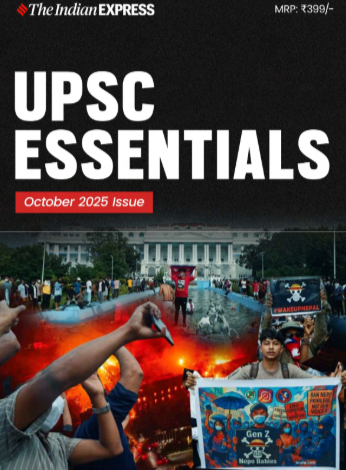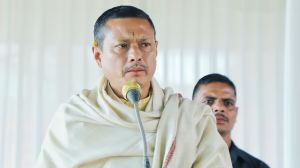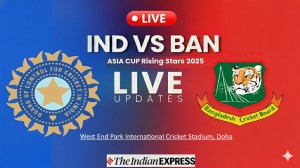Manas Srivastava leads the UPSC Essentials section of The Indian Express (digital). He majorly writes on UPSC, other competitive exams and education-related projects. In the past, Manas has represented India at the G-20 Youth Summit in Mexico. He is a former member of the Youth Council, GOI. A two-time topper/gold medallist in History (both in graduation and post-graduation) from Delhi University, he has mentored and taught UPSC aspirants for more than five years. His diverse role in The Indian Express consists of writing, editing, anchoring/ hosting, interviewing experts, and curating and simplifying news for the benefit of students. He hosts the YouTube talk show called ‘Art and Culture with Devdutt Pattanaik’ and a LIVE series on Instagram and YouTube called ‘LIVE with Manas’.His talks on ‘How to read a newspaper’ focus on newspaper reading as an essential habit for students. His articles and videos aim at finding solutions to the general queries of students and hence he believes in being students' editor, preparing them not just for any exam but helping them to become informed citizens. This is where he makes his teaching profession meet journalism. He is also the editor of UPSC Essentials' monthly magazine for the aspirants. He is a recipient of the Dip Chand Memorial Award, the Lala Ram Mohan Prize and Prof. Papiya Ghosh Memorial Prize for academic excellence. He was also awarded the University’s Post-Graduate Scholarship for pursuing M.A. in History where he chose to specialise in Ancient India due to his keen interest in Archaeology. He has also successfully completed a Certificate course on Women’s Studies by the Women’s Studies Development Centre, DU. As a part of N.S.S in the past, Manas has worked with national and international organisations and has shown keen interest and active participation in Social Service. He has led and been a part of projects involving areas such as gender sensitisation, persons with disability, helping slum dwellers, environment, adopting our heritage programme. He has also presented a case study on ‘Psychological stress among students’ at ICSQCC- Sri Lanka. As a compere for seminars and other events he likes to keep his orating hobby alive. His interests also lie in International Relations, Governance, Social issues, Essays and poetry. ... Read More
UPSC Essentials: Key terms of the past week with MCQs
From Uniform Civil Code to ‘Blue Flag’ tag — here's a highlight of some of the important terms useful for UPSC CSE Prelims and Mains preparation. Don't miss solving the MCQs.
 Key terms of the past week that you must not ignore. ( Representative image)
Key terms of the past week that you must not ignore. ( Representative image)Essential key terms from the last week’s news headlines or between the lines categorised as per the relevance to the UPSC-CSE syllabus along with the MCQs followed.
— Gujarat Home Minister Harsh Sanghavi on Saturday (October 29) announced the formation of a committee to implement a uniform civil code (UCC) in the state. In May this year, Uttarakhand announced a committee led by retired Supreme Court judge Justice Ranjana Desai to carry out a similar exercise. Assam and Himachal Pradesh, also ruled by the BJP, too have supported the idea of a UCC.
— The Constitution lists the UCC among the Directive Principles of State Policy, which makes it a desirable objective, but it is not justiciable. Over the decades, the BJP in particular has pushed for a UCC, and the Supreme Court has on a few occasions expressed itself in favour of it.
KEY TAKEAWAYS
— A UCC would provide for one law for the entire country, applicable to all religious communities in their personal matters such as marriage, divorce, inheritance, adoption, etc. Article 44 of the Indian constitution says, “The state shall endeavour to secure a Uniform Civil Code for the citizens throughout the territory of India.”
— Article 44 is one of the Directive Principles of State Policy, described in Part IV of the Constitution. According to Article 37, “The provisions contained in this Part shall not be enforceable by any court, but the principles therein laid down are nevertheless fundamental in the governance of the country and it shall be the duty of the State to apply these principles in making laws.”
— Part IV (Articles 36-51) covers a wide range of principles, including (apart from the UCC), the securing of equal justice and free legal aid to citizens (Art 39A), participation of workers in the management of industries (Art 43A), organisation of agriculture and animal husbandry (Art 48), protection and improvement of the environment and safeguarding of forests and wildlife (Art 48A), promotion of international peace and security (Art 51) etc.
What is the relationship between Fundamental Rights and Directive Principles?
— The Directive Principles of State Policy follow the Fundamental Rights (Part III, Arts 12-35) in the Constitution. The Fundamental Rights lie at the heart of the Constitution, and are justiciable — that is, they are legally enforceable in a court of law.
— In its landmark Minerva Mills judgment (1980), the Supreme Court held: “Indian Constitution is founded on the bed-rock of the balance between Parts III (Fundamental Rights) and IV (Directive Principles). To give absolute primacy to one over the other is to disturb the harmony of the Constitution.”
— Article 31C says that if a law is made to implement any of the Directive Principles, it cannot be challenged on the ground of being violative of the Fundamental Rights under Articles 14 and 19.
So currently, is there no ‘uniformity’ in personal law?
— Indian laws are already uniform in most civil matters — for example, The Indian Contract Act, Civil Procedure Code, Sale of Goods Act, Transfer of Property Act, Partnership Act, Evidence Act, etc. However, states have made a large number of amendments, and so, there is diversity even in the secular civil laws in certain aspects.
— Personal laws of religions are diverse in themselves. Thus, all Hindus of the country are not governed by one law, nor are all Muslims or all Christians. Not only British legal traditions, even those of the Portuguese and the French remain operative in some parts.
— In the Northeast, there are more than 200 tribes with their own varied customary laws. The Constitution itself protects local customs in Nagaland. Similar protections are enjoyed by Meghalaya and Mizoram. Even reformed Hindu law, in spite of codification, protects customary practices.
Point to ponder: What is the debate around Uniform Civil Code?
1. MCQ:
Which article of the Indian constitution says, “The state shall endeavour to secure a Uniform Civil Code for the citizens throughout the territory of India.”
(a) Article 14
(b) Article 28
(c) Article 32
(d) Article 44
FCRA
Why in news?
— The Ministry of Home Affairs has cancelled the Foreign Contribution (Regulation) Act (FCRA) licence of Rajiv Gandhi Foundation (RGF) and Rajiv Gandhi Charitable Trust (RGCT), organisations that are associated with the Nehru-Gandhi family, for alleged violations of the provisions of the Act.
KEY TAKEAWAYS
Law on foreign funds
— FCRA seeks to “regulate the acceptance and utilisation of foreign contribution or foreign hospitality by certain individuals or associations or companies and to prohibit [such] acceptance and utilisation…for any activities detrimental to the national interest…”
— The law was enacted during the Emergency in 1976 amid apprehension that foreign powers were interfering in India’s affairs by pumping in funds through independent organisations. These concerns had been expressed in Parliament as early as in 1969. The law sought to regulate foreign donations to individuals and associations so that they functioned “in a manner consistent with the values of a sovereign democratic republic”
— An amended FCRA was enacted under the UPA government in 2010. The law was amended again by the current government in 2020, giving the government tighter control and scrutiny over the receipt and utilisation of foreign funds by NGOs. A legal challenge to the 2020 amendments was rejected by the Supreme Court in April 2022.
Provisions of the Act
— Broadly, the FCRA requires every person or NGO wishing to receive foreign donations to be registered under the Act, to open a bank account for the receipt of the foreign funds in State Bank of India, Delhi, and to utilise those funds only for the purpose for which they have been received, and as stipulated in the Act.
— They are also required to file annual returns, and they must not transfer the funds to another NGO.
— The Act prohibits receipt of foreign funds by candidates for elections, journalists or newspaper and media broadcast companies, judges and government servants, members of legislature and political parties or their office-bearers, and organisations of a political nature.
Registration under FCRA
— NGOs that want to receive foreign funds must apply online in a prescribed format with the required documentation. FCRA registrations are granted to individuals or associations that have definite cultural, economic, educational, religious, and social programmes.
— Following the application, the MHA makes inquiries through the Intelligence Bureau into the antecedents of the applicant, and accordingly processes the application. The MHA is required to approve or reject the application within 90 days — failing which it is expected to inform the NGO of the reasons for the same.
— Once granted, FCRA registration is valid for five years. NGOs are expected to apply for renewal within six months of the date of expiry of registration. In case of failure to apply for renewal, the registration is deemed to have expired.
Cancellation of approval
— The government reserves the right to cancel the FCRA registration of any NGO if it finds it to be in violation of the Act. Registration can be cancelled for a range of reasons including, if “in the opinion of the Central Government, it is necessary in the public interest to cancel the certificate”. Once the registration of an NGO is cancelled, it is not eligible for re-registration for three years. All orders of the government can be challenged in the High Court.
Point to ponder: Foreign Contributions serve as medicine only till the time it is consumed moderately and discreetly. Do you agree?
2. MCQ:
Consider the following statements and select the incorrect option.
a) FCRA registrations are granted to individuals or associations that have definite cultural, economic, educational, religious, and social programmes.
b) Once granted, FCRA registration is valid for five years.
c) FCRA is implemented by the Ministry of Finance.
d) FCRA bars public servants from receiving foreign contributions.
Satellite phones
Why in news?
— A senior executive of Saudi Arabian oil company Saudi Aramco spent several days in prison in Chamoli district of Uttarakhand after he was arrested by police in July with an unauthorised satellite phone, The Indian Express reported. He was released on July 27 after paying a fine of Rs 1,000, police said.
KEY TAKEAWAYS
What’s wrong with carrying a satellite phone?
— It is not legal to carry one in India unless you have permission. Visitors to the country are specifically advised not to carry a satellite phone without permission. Restrictions on the possession and use of these phones were tightened after the Pakistani terrorists who attacked Mumbai in November 2008 used these devices to keep in touch with their Lashkar-e-Taiba handlers.
— Narendra Singh Rawat, station house officer of Govind Ghat police station in Chamoli said the executive, Fergus MacLeod, was arrested under sections of the Indian Telegraph Act and the Indian Wireless Telegraphy Act.
What do these rules say?
— Section 6 of The Indian Wireless Telegraphy Act, 1933 makes it illegal to possess “any wireless telegraphy apparatus, other than a wireless transmitter, in contravention of the provisions of section 3 [of the Act]”. Section 3 says “no person shall possess wireless telegraphy apparatus” without a licence “save as provided by Section 4”.
— The Section 4 of the Act allows the central government to make rules under the Act to “exempt any person or any class of persons from the provisions of this Act either generally or subject to prescribed conditions, or in respect of specified wireless telegraphy apparatus”.
— A notification on the website of the Department of Telecommunications says: “Satellite phones are permitted: (i) With specific permission/ NOC from Department of Telecommunications, Government of India; or (ii) As provisioned by M/s BSNL in accordance with license granted to M/s BSNL for provision and operation of satellite based service using Gateway installed in India.”
— Notifications posted on the websites of the Indian Embassy in several countries around the world specify that “Use of Thuraya/Iridium satellite phones is unauthorized/illegal in India”, and that “any passenger carrying satellite phone(s) via baggage is required to declare the same to Customs on arrival and produce permission for use from the concerned authority.”
— Also, the notifications say, “any individual found to be in possession of an unauthorized satellite phone in India is liable to be prosecuted as per Indian law, and all unauthorized sets found in possession of the individual will be seized by Indian law enforcement agencies”.
— Therefore, “visitors and tourists traveling to India are advised to comply with Indian laws and not bring in or use satellite phones in India without obtaining specific permission from the concerned authorities.”
How does a satellite phone work?
— Satellite connectivity relies on satellites — rather than cell phone towers, which provide connectivity to regular cell phones. Satellite phones work in remote areas where there are no cell phone towers and therefore, no cellular connectivity. Satellite (or sat) phones usually cover most of the planet with fairly robust connectivity.
Can you get a sat phone for yourself?
— Theoretically, yes, as long as they are allowed by law, and the requisite permissions have been obtained. If you need to use a satellite phone inside the country, you must purchase it in India from an authorised distributor.
— But then, having one would make sense only if you really need one.
— For one, sat phones are much more expensive than regular cell phones. The device may cost around $1,000 or more, and monthly/yearly plans can cost hundreds of dollars each year. The talk-time with these plans is limited, so using the phone for longer means shelling out more. People and companies who need these phones often choose to rent them — say, for the duration of their stay in a remote location during a vacation.
— There are a few well known satellite connectivity providers. These are Iridium, Inmarsat, Thuraya and Globalstar. Each sat phone device works only with a specific provider — which means a Thuraya phone will not work on the Iridium network.
Point to ponder: Satellite communications to play key role in driving India’s tech ambitions, internet reach. Discuss.
3. MCQ:
Iridium, Inmarsat, Thuraya and Globalstar are related to:
a) Web 3.0
b) Cyclones
c) Satellite connectivity providers
d) Space missions
News Broadcasting & Digital Standards Authority
Why in news?
— The News Broadcasting & Digital Standards Authority (NBDSA), a self-regulatory agency set up by news and digital broadcasters, has fined the Hindi TV channel News18 India Rs 50,000 for turning a news debate on hijab into a “communal issue” and not adhering to guidelines. The NBDSA held that the programme was in violation of the principles relating to impartiality, neutrality, fairness and good taste and decency.
— The NBDSA, which adjudicates upon complaints about news broadcasts, said it did not have any problem with the subject but with the narrative of the debate. In its order, the NBDSA noted that it was permissible for the broadcaster to have a debate on students wearing hijab in educational institutions.
— This is not the first time a channel has seen a complaint against it through the NBDSA, and though it is not a government or legal organisation, its rulings matter within the industry.
KEY TAKEAWAYS
What is the News Broadcasting & Digital Standards Authority (NBDSA)?
— The NBDSA is an independent body set up by the News Broadcasters & Digital Association (NBDA), which serves as a representative of private television news, current affairs and digital broadcasters. It describes itself as “the collective voice of the news, current affairs and digital broadcasters in India.”
— Funded entirely by its members, the NBDA has 26 news and current affairs broadcasters (comprising 119 news and current affairs channels) as its members. Various senior members of Indian media organisations serve on its Board of Directors.
— Apart from presenting a unified front, it carries out activities “to promote, protect and secure the interests including the right of freedom of speech and expression of the news broadcasters, digital news media and other related entities.”
— It shares developments in the industry with members, provides a space for achieving common goals and consensus and aims to protect all its members from persons carrying “unfair and/or unethical practices or who discredit the television news broadcasters, digital news media and other related entities,” according to its stated objectives.
How does the NBDSA function, and what powers does it have?
— Within this structure, the NBDSA has to “lay-down and foster high standards, ethics and practices in news broadcasting, including entertaining and deciding complaints against or in respect of broadcasters”. These standards mention a focus on objectivity, impartiality, maintaining discretion when reporting on crime against women and children, not endangering national security, etc.
— The body includes a Chairperson who is to be an eminent jurist, and other members such as news editors, and those experienced in the field of law, education, literature, public administration, etc. nominated by a majority of the Board. Former Supreme Court judge and jurist AK Sikri is currently serving as the Chairperson.
— The Authority may initiate proceedings on its own and issue notice or take action in respect to any matter which falls within its regulations. This can also be through complaints referred to the Authority by the Ministry of Information & Broadcasting or any other governmental body, or by anyone else via its website
— A “two-tier” procedure is in place for redressing grievances, where any person aggrieved by the content of any broadcast is required to first make a complaint to the concerned broadcaster and if they are not satisfied by the redress, a complaint can be filed before the Authority.
— Those cases which have already been taken to court cannot be complained against. Within 14 days from the date of receipt of a complaint, the Authority will issue notice to the concerned broadcaster to show cause why action should not be taken under the regulations. An inquiry is held in which proof, documents, and people can be called in by the authority. If the complainant or the respondent does not get back to the Authority, the complaint can be set aside.
— The NBDSA may, for reasons to be recorded in writing, warn, censure, express disapproval against and/or impose a fine upon the broadcaster. It can also recommend to the concerned authority for suspension/revocation of the license of such broadcaster. The fine imposed by the Authority shall not exceed Rs. 1 lakh and such fine shall be recovered from the concerned broadcaster.
(source: What is the News Broadcasting & Digital Standards Authority? by Rishika Singh )
Point to ponder: What should be the Code of Ethics for Media?
4. MCQ:
Which of the following statements is/are not true with respect to News Broadcasting & Digital Standards Authority (NBDSA)?
1. The NBDSA is an independent body set up by the News Broadcasters & Digital Association (NBDA).
2. It is funded entirely by Ministry of Information and Broadcasting, Government of India.
a) Only 1 b) Only 2
c) Both 1 and 2 d) Neither 1 nor 2
‘Blue Flag’ tag
Why in news?
— Two more beaches, both in Lakshadweep, have been , putting them in an elite list of the world’s cleanest and most eco-friendly “beaches, marinas and sustainable boating tourism operators”.
— The two new beaches to have been awarded the eco-label are Minicoy Thundi beach and Kadmat beach, both in Lakshadweep.
— India now has 12 “blue beaches”, Minister for Environment, Forest & Climate Change Bhupender Yadav posted on Twitter on October 26.
KEY TAKEAWAYS
The Blue Flag
— The Blue Flag is an exclusive eco-label or certification that is given to coastal locations around the world as a badge of environmental honour. The Blue Flag programme is run by the Copenhagen, Denmark-headquartered Foundation for Environmental Education (FEE), a nonprofit which, through its work, contributes to the Sustainable Development Goals (SDGs) of the United Nations.
— According to the FEE, “the iconic Blue Flag is one of the world’s most recognised voluntary awards for beaches, marinas, and sustainable boating tourism operators. In order to qualify for the Blue Flag, a series of stringent environmental, educational, safety, and accessibility criteria must be met and maintained.”
— The Blue Flag programme started in 1987, initially in Europe. Certification is awarded annually. A total 5,042 beaches, marinas, and tourism boats in 48 countries have been awarded the label so far. A marina is a small harbour where mainly pleasure boats and yachts dock.
— The certification is given by an international jury comprising members of the United Nations Environment Programme (UNEP), United Nations World Tourism Organisation (UNWTO), and International Union for the Conservation of Nature (IUCN), besides FEE.
“Central to the ideals of the Blue Flag programme is the aim of connecting the public with their surroundings and encouraging them to learn more about their environment,” the FEE says on its website, a goal that Prime Minister Modi too has flagged.
Beaches in India
— Minister Yadav described Thundi as “one of the most pristine and picturesque beaches in the archipelago where white sand is lined by turquoise blue water of the lagoon”, and said Kadmat is “especially popular with cruise tourists who visit the island for water sports”.
— The other 10 Indian beaches on the list, according to the FEE site, are Shivrajpur in Gujarat’s Devbhumi Dwarka district; Ghogla beach in Diu; Kasarkod (Uttara Kannada) and Padubidri (Udupi) in Karnataka; Kappad (Kozhikode) in Kerala; Eden beach in Puducherry; Kovalam (Chennai) in Tamil Nadu; Rushikonda (Visakhapatnam) in Andhra Pradesh; Golden beach in Puri, Odisha; and Radhanagar Swarajdeep in Andaman and Nicobar.
— Kovalam and Eden got the Blue Flag last year. The other eight beaches received the certification in 2020, and were re-certified last year.
Do’s and Don’ts
— In January 2020, an Extraordinary Gazette Notification gave a list of permissible activities and facilities in the CRZ of the beaches, including islands, subject to maintaining a minimum distance of 10 metres from the High Tide Line (HTL), for the purposes of Blue Flag certification.
— These included portable toilet blocks, change rooms and shower panels; solid waste management plant; solar power plant; purified drinking water facility; beach access pathways; landscaping lighting; seating benches and sit-out umbrellas; cloak room facility; safety watch towers and beach safety equipment; information boards and other signages; fencing; and parking facilities.
— The notification said that these activities and facilities would be exempt from prior clearance under the provisions of CRZ Notification, Island Protection Zone Notification and Island Coastal Regulation Zone Notifications.
Point to ponder: The world needs to shift to a paradigm of environmental philosophy that is anchored in environmental consciousness rather than merely government regulations. Discuss.
5. MCQ:
Which of the following statements are not true with respect to The Blue Flag programme?
a) It is run by the Copenhagen, Denmark-headquartered Foundation for Environmental Education (FEE).
b) India now has 12 “blue beaches” accorded the ‘Blue Flag’ tag.
c) Central to the ideals of the Blue Flag programme is the aim of connecting the public with their surroundings and encouraging them to learn more about their environment.
d) The two latest beaches to have been awarded the eco-label are Minicoy Thundi beach and Kadmat beach, both in Andaman and Nicobar Islands.
Answer to the MCQs: 1 (d), 2 (c), 3 (c), 4 (b), 5 (d)
UPSC Magazine

Read UPSC Magazine



- 01
- 02
- 03
- 04
- 05





























